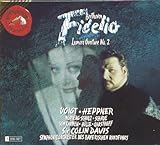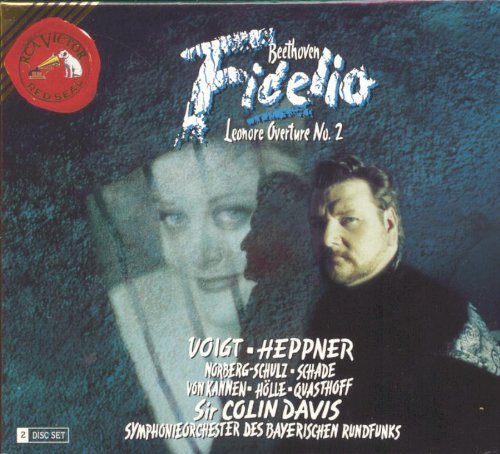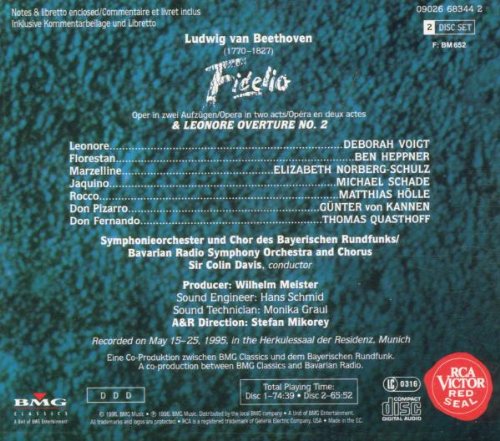Ludwig van Beethoven Album: «Beethoven: Fidelio / Leonore Overture No. 2»

- Customers rating: (4.0 of 5)
- Title:Beethoven: Fidelio / Leonore Overture No. 2
- Release date:1996-08-13
- Type:Audio CD
- Label:RCA
- UPC:902668344260
- 1 - 1Fidelio & Leonore Overture No. 2: Ouverture
- 1 - 2Fidelio & Leonore Overture No. 2: Act I - No.1 - Duett: 'Jetzt, Schätzchen, jetzt sind wir allein' (Marzelline, Jaquino)
- 1 - 3Fidelio & Leonore Overture No. 2: Act I - No.2 - Arie: 'O wär ich schon mit dir vereint' (Marzelline)
- 1 - 4Fidelio & Leonore Overture No. 2: Act I - No.3 - Quartett: 'Mir Ist So Wunderbar' (Marzelline, Jaquino, Leonore, Rocco)
- 1 - 5Fidelio & Leonore Overture No. 2: Act I - No.4 - Arie: 'Hat Man Nicht Auch Gold Beineben' (Rocco)
- 1 - 6Fidelio & Leonore Overture No. 2: Act I - No.5 - Terzett: 'Gut, Söhnchen, gut, hab immer Mut' (Marzelline, Leonore, Rocco)
- 1 - 7Fidelio & Leonore Overture No. 2: Act I - No.6 - Marsch
- 1 - 8Fidelio & Leonore Overture No. 2: Act I - No.7 - Arie Mit Chor: 'Ha, Welch Ein Augenblick' (Pizarro, Rocco)
- 1 - 9Fidelio & Leonore Overture No. 2: Act I - No.8 - Duett: 'Jetzt, Alter, Jetzt Hat Es Eile' (Pizarro, Rocco)
- 1 - 10Fidelio & Leonore Overture No. 2: Act I - No.9 - Rezitativ Und Arie: 'Abscheulicher, Wo Eilst Du Hin?' (Leonore)
- 1 - 11Fidelio & Leonore Overture No. 2: Act I - No.10-1- Finale: 'O Welche Lust, In Freier Luft (Marzelline, Jaquino, Leonore, Rocco, Pizarro)
- 1 - 12Fidelio & Leonore Overture No. 2: Act I - No.10-2: 'Nun Sprecht, Wie Gings?' (Leonore, Rocco)
- 1 - 13Fidelio & Leonore Overture No. 2: Act I - No.10-3: 'Ach Vater, Eilt' (Marzelline, Jaquino, Leonore, Rocco)
- 1 - 14Fidelio & Leonore Overture No. 2: Act I - No.10-4: 'Verwegner Alter' (Pizarro, Rocco)
- 1 - 15Fidelio & Leonore Overture No. 2: Act I - No.10-5: 'Leb Wohl, Du Warmes Sonnenlicht' (Marzelline, Jaquino, Leonore, Rocco, Pizarro)
- 2 - 1Fidelio & Leonore Overture No. 2: Act II - No.11 - Introduktion Und Arie: 'Gott, Welch Dunkel Hier (Florestan)
- 2 - 2Fidelio & Leonore Overture No. 2: Act II - No.12-1 Melodrama (Leonore, Rocco)
- 2 - 3Fidelio & Leonore Overture No. 2: Act II - No.12-2 Duett: 'Nur Hurtig Fort, Nur Frisch Gegraben' (Leonore, Rocco)
- 2 - 4Fidelio & Leonore Overture No. 2: Act II - No.13 Terzett: 'Euch Werde Lohn In Besseren Welten' (Leonore, Florestan, Rocco)
- 2 - 5Fidelio & Leonore Overture No. 2: Act II - No.14-1 Quartett: 'Er Sterbe!' (Pizarro, Leonore, Florestan, Rocco)
- 2 - 6Fidelio & Leonore Overture No. 2: Act II - No.14-2 'Es schlägt der Rache Stunde' (Pizarro, Leonore, Florestan, Rocco)
- 2 - 7Fidelio & Leonore Overture No. 2: Act II - No.15 Duett: 'O Namenlose Freude' (Leonore, Florestan)
- 2 - 8Fidelio & Leonore Overture No. 2: Act II - No.16-1 Finale: 'Heil Sei Dem Tag, Heil Sei Der Stunde'
- 2 - 9Fidelio & Leonore Overture No. 2: Act II - No.16-2 'Des besten Königs Wink und Wille' (Don Fernando, Leonore, Marzelline, Rocco, Pizarro)
- 2 - 10Fidelio & Leonore Overture No. 2: Act II - No.16-3 'Wer Ein Holdes Weib Errungen' (Don Fernando, Leonore, Florestan, Marzelline, Jaquino, Rocco, Pizarro)
- 2 - 11Fidelio & Leonore Overture No. 2: Act II - Leonoren Ouverture No. 2 - Leonore Overture No.2
I have to admit that I like the recording with Jessy Norman better, and feel it has more to offer, but that is because it offers the incredible voice of Jessye Norman. That said, I must admit this is a wonderful recording, and well worth the money. I have many recordings of this work, even a few of its original version called Leonore. Beethoven much improved the work between the time of its original writing and 1814 when the Fidelio version was written.
Everything about this recording is moving to the extreme! The voices work well together, and the orchestra is there with them, not just an accompaniment, nor a filler, nor is it more prominent than the voice as in the Bernstein recording ( which has very inferior singers ). Everything here works to a wonderful whole. Heppner is just too good to be true, and too healthy sounding for a man in prison a few years, but one has to admit, who really cares when the singing is so wonderful. There is no way on earth Voigt could convince anyone she is a young man ( Norman has a darker sound that has a sort of Masculine timbre to it that works better ), but then again, who really cares when the singing is so wonderful. Putting the Leonore Overture #2 at the end I think is a good thing. It is often played during the scene break of the last act, but that breaks up the very heady drama we have witnessed before our eyes. I much prefer this reading and having it as an addition at the end.
Beethoven's music is as wonderful as ever, and he wrote this incredible work when he was deaf. I would recommend buy this recording. It is just so good.
Just before the major record companies jumped ship on opera recordings, three digital Fidelios were issued: this one from RCA, another under Dohnanyi on Decca, and a version with Jesseye Norman under Haitink on Philips. Each turned out to be a frustrating disappointment.
The Dohnanyi set had an overparted Leonore and boring conducting. Jesseye Norman was paired with a puny Florestan and suffered from Haitink's listless pacing. This set is probably the best of the three, because Heppner is truly great as Florestan, the best tenor in the role since Jon Vickers, who crowns both the classic Klemperer set and the almost-as-good Karajan, both on EMI. If only he could be spliced into Norman's commanding (if diva-scented) performance as Leonore.
Sadly, Colin Davis, who went through a long stretch of dull conducting in Bavaria, is fairly listless himself on this occasion. The bigger problem for me is Voigt, who doesn't have a Leonore voice. She has gleaming top notes but a gargly, weak lower register--and Leonore must sing a lot in that register. She also has a generic conception of the role dramatically, with no special fire or inner urgency.
All in all, this is the best Fidelio since the great ones came out decades ago, but except for Heppner, no one involved rivals the classic sets.
I think that this recording is pretty good. There are little bitty problems I have here. One, is that I have nver heard such low voices in the main roles of "Leonore" and "Florestan", the little role of Don Fernando, (No offense) sounds like he is stuttering, the Don Pizzaro, sounds to much like he is talking, while he is singing. The Marzelline, Jaucquino, and the Rocco roles are absolutely beatiful! And lastly, the three arias of the act, no.2, no.3, no.4, no.5, no.6 no.7 no.8, no,9,and the ouverture, were played a little to fast, leaving the dialog enough time to fill up the time capacity. All in all, the recording, was great but, the finales and all of Act Two was played to slowly, and the Famous Quartetto in the second act, and the famous finale of the first act, was played to slow. You see, I classify my fav. conductors by whom they play, Leonard Bernstein and Herbert Von Karajan are the only two who can play Beethoven at the right tempo, and everything, and Sir Colin Davis, can play Mozart really well. All in all, the Opera was a good recording


